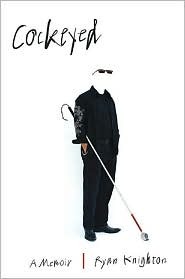All through middle school to high school, I have been obsessed with the idea or perhaps the fashion of wearing glasses or even better, contact lenses. I had the notion that it made people look smarter and more responsible and I still think that. However, I became conscious of the fact that these common eye defects can be a bigger issue than they seem when i read an article of Jill Allen-King. This story does not only make me feel sorry as a reader but also makes me aware of the various disabilities or diseases which can suddenly destroy the future of people. Jill Allen-King, lost one eye right after her first birthday and lost the other on her wedding day. However these two important days were been stained by the memory of she losing her eyes to Glaucoma.
Furthermore, in my ASTU class, reading Cockeyed by Ryan Knighton reminds me of the feelings I had towards reading the story of Jill Allen-King. This memoir prepares the reader for Knighton’s trauma yet encouraging approach to making blindness work. In Cockeyed, Knighton narrates in first person by using the pronoun ‘I’. With this, the reader is able to understand the writer from his direct point of view. However, getting to the core of the book, I realized the conflict between Knighton identifying himself as I and the general public identifying him as ‘him’.
This degrades the identity of Knighton which often depicts him as part of the disabled minority. Knighton’s unique point of view shows his feelings towards his situation and also the typical reaction of the general public towards his disability. This does not only help build a bond or connection with the reader but also allows the reader to sympathize with the sufferings and trauma of the disabled writer. The reader in this case becomes the ‘I’ of the story and starts to understand the writer more.
Through the use of insightful thoughts and colorful imagery, Knighton tries to educate the reader by making his reader aware of the account of the world from the perspective of being blind. Moreover, what I found fascinating in this book is the fact that the book is not based on blindness and its defeating nature but rather about a blind man who endeavors not to be bounded by his calamity. All through the book, there are instances where Knighton becomes resistant to his situation and in the process he tends to deny his fate. However, the experiences he faces, the people he meets and those he loses help shape his life and define the aspects of his environment.
In all, like some other books I’ve read about blind men, Ryan Knighton’s Cockeyed portrayed him as independent and a brave survivor.
For those who want to read more on Jill Allen-King (theguardian.com/…/experience-went-blind-wedding-day)